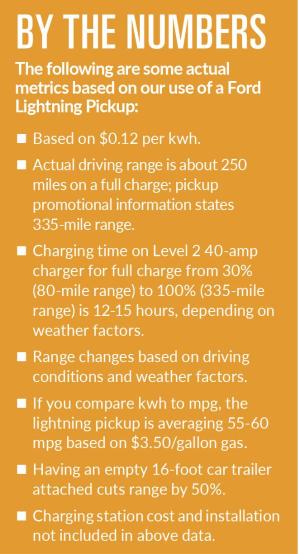By Kevin Wheeler, General Manager/CEO of Access Energy Cooperative
Access Energy Cooperative has been using an all-electric Ford F-150 Lightning pickup for research on electric vehicles (EVs). This investment will help us be better prepared to answer our members’ questions about EVs. In the coming months, we will share information about the pickup, charging details and overall effects of the vehicle.
 Understanding charging levels
Understanding charging levels
If you are considering an EV, one of the first questions you need to ask is, “How and where am I going to charge the vehicle?” This seems like a very simple question, but it is not. EV charging stations are categorized into different levels based on the charging power they provide, and the time required to charge the vehicle. The commonly recognized levels are Level 1, Level 2 and Level 3.
Level 1 charging This is the most basic and widely available charging option for EVs. It uses a standard 120-volt AC household outlet, typically found in residential settings. Level 1 chargers provide a charging power of around 1-2 kilowatts (kW). They are known for convenience and simplicity, as they require no additional installation. However, due to their lower charging power, Level 1 chargers are relatively slow, taking several hours to a few days to fully charge an EV, depending on battery capacity.
Level 2 charging This offers a faster and more efficient charging option. It requires a 240-volt AC power source, similar to the type used for larger appliances like clothes dryers. Level 2 chargers typically provide a charging power range of 3.3-22 kW, depending on the charging station and vehicle capabilities. They can be installed at homes, workplaces, public parking lots and commercial locations. This type of charger will need to be installed by a licensed electrician. Level 2 charging significantly reduces charging time compared to Level 1, allowing vehicles to fully charge in a matter of a few hours in some cases.
Level 3 charging (also known as DC fast charging) This represents the highest charging power and the quickest charging option for EVs. DC fast charging stations use direct current (DC) instead of alternating current (AC) to charge the vehicle’s battery. They provide charging power ranging from 50-350 kW, depending on the specific charging station. Level 3 chargers are commonly found along highways, major travel routes and high traffic areas. They enable rapid charging, allowing EVs to achieve an 80% charge in typically 20-60 minutes, depending on the vehicle’s battery capacity and charging speed compatibility.
It is worth noting that different EVs have varying charging capabilities and may not be compatible with all charging stations. Therefore, it’s necessary for EV owners to verify their vehicle’s charging specifications and ensure compatibility with the charging station before use.
Charging
When it comes to finding charging stations, technology is our greatest ally. Utilizing smartphone apps, in-vehicle systems, or computer searches, we can effortlessly locate charging infrastructure. These tools not only reveal the charging locations but also provide essential information such as charger type, availability, and most importantly: the cost of charging.
For many EV owners, Level 2 home chargers are a reliable and cost-effective choice. The cost of charging at home is directly linked to the local electricity rates. In our case, the kilowatt-hour charge stands at $0.1052. It is essential to remember this rate does not encompass additional expenses like the base charge or the initial investment in the charging station and installation of it. Residential Level 2 charging stations typically have a base price of around $600. This cost can vary depending on factors like available space within your electrical panel and your house’s service capacity.
One common issue we have found is a discrepancy between the information provided by charging apps and the actual working condition of charging stations. This unpredictability can sometimes disrupt travel plans, requiring adaptability and collaboration with relevant authorities to enhance charging infrastructure.
CHARGING COSTS
Turning our attention to a crucial aspect of electric vehicle ownership is charging costs. As leaders in the EV community, our goal is to provide valuable insights and guidance to current and future EV owners.
When it comes to finding charging stations, technology is our greatest ally. Utilizing smartphone apps, in-vehicle systems, or computer searches, we can effortlessly locate charging infrastructure. These tools not only reveal the charging locations but also provide essential information such as charger type, availability, and most importantly: the cost of charging.
For many EV owners, Level 2 home chargers are a reliable and cost-effective choice. The cost of charging at home is directly linked to the local electricity rates. In our case, the kilowatt-hour charge stands at $0.1052. It is essential to remember this rate does not encompass additional expenses like the base charge or the initial investment in the charging station and installation of it. Residential Level 2 charging stations typically have a base price of around $600. This cost can vary depending on factors like available space within your electrical panel and your house’s service capacity.
One common issue we have found is a discrepancy between the information provided by charging apps and the actual working condition of charging stations. This unpredictability can sometimes disrupt travel plans, requiring adaptability and collaboration with relevant authorities to enhance charging infrastructure.

